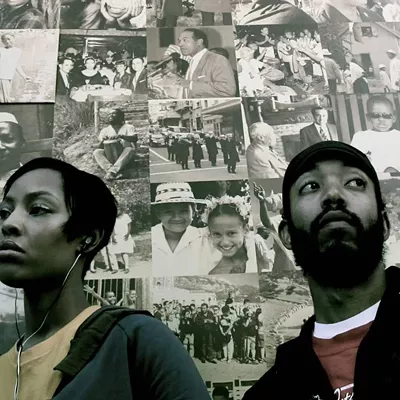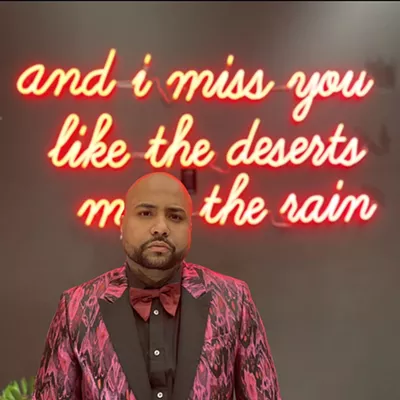It's almost impossible to imagine how astonishing it was when it first came out, but the oldest working female rock critic will tell you how, while driving a newish tan Mustang west on Camelback Road in Phoenix in the fall of 1966, I heard it for the first time on the radio and had to pull over and stop the car to listen. The instrumentation, harmonies and dynamics had an inherent drama that was inescapable; never mind that the lyrics were about, let's see, girls, cars or California.
There's no comparison to the impact of "Good Vibrations," not just on me, but on the whole of popular music; its like may never be heard again. But I had occasion to recall that moment a few weeks ago as I pulled over on Country Club Road and stopped my vintage red Honda to listen to Grand Champeen's "Gonna Be the Death of Me," from their latest album, Dial T for This.
To the extent that Grand Champeen has stolen a foothold in the consciousness of fans and critics across the country, it's been on the strength of their live act, sensational enough to have taken even their hometown of Austin, Texas, by storm. Boundless energy, infectious good humor, loud guitars, intense playing, intelligent and committed devotion to rocking everyone within earshot--these are the band's hallmarks, and they've only gotten keener over the 17 years since Grand Champeen played their first gig as high school freshmen.
The band's had trouble, though, translating all that to recorded work, a not-uncommon problem among popular live acts. They came the closest with the 2002 release Battle Cry for Help, a cry they ultimately heeded themselves, and that has made all the difference.
"At the time, when it came out, we realized it was really sloppy, and the performances just weren't up to snuff, and we just realized pretty early on that it wasn't anything that was going to catapult our career in any way, shape or form," says band leader, guitarist and songwriter Channing Lewis.
"After doing a little touring on that record with some really great bands, who really had their shit together and were really good every night, we took a hard look in the mirror and kind of agreed that we needed to get better as a band before we did anything else. It wasn't going to help to make another sloppy, out-of-tune, disaster of a record."
That epiphany led to three years of self-discipline and discovery. "A large part of that gap was us just getting in the woodshed and really practicing music and trying to sing better. We wanted to be just a tighter, more competent unit before we made another record, so that we could make something that was really solid and sounded really awesome."
The musicianship wasn't such a stretch; all the band's members have had some formal music education, and, according to Lewis, "(Guitarist Michael) Crow was on a fast track to becoming a concert violinist, was actually accepted to Oberlin Conservatory."
At the same time, the Beach Boys' nemesis, The Beatles, inspired a new spirit of adventure in the band: "We decided it was time to learn a few Beatles songs, because we try to know a couple of songs by just about everybody." Fans of the band's live sets eagerly await their consistently surprising covers, but The Beatles songs proved transformative.
"McCartney's songs especially are very complex. Lennon's songs tend to have more balls, more attitude; (they're) probably a little 'cooler,' but McCartney's songs are definitely more harmonically challenging; the chord progressions are really cool. Certainly, our approach was altered."
Lewis says the diversity of their music inspired Grand Champeen to break their own mold. "We had always had this fear of putting out a record that didn't kick enough ass," Lewis says. "The thing that stands out to me (about The Beatles) is just the insane variety of what they were willing to put on one record, and put songs next to each other that have no business being even by the same band. To me, that's the best thing about them: They just have no fear."
And so we come to "Gonna Be the Death of Me." The song is so fearless, there's not even a guitar on it. Crow has arranged parts for strings (!) and horns (!!), adding pedal steel over the chorus. Alex Livingstone upturns the traditional anchoring role of the bass to drop in a counterpoint melody, and then overtracks on piano. Harmonies chime in an inverted scale to the melody, and it all still kicks more than enough ass. The intensity of the tempo and the depth of the sonic palette signal a manic energy in a dark direction.
So what's the song about? Lewis writes what he knows. "I've been not only in the same band for 17 years; I've been in the same relationship for 14 years, so love songs are hard for me to write--not that I don't love my wife, but I guess I just channel that into writing songs about being in a band."
Dial T for This is loaded with songs that, Lewis hastens to clarify, may or may not be about being in a band (or a marriage), and in any case aren't necessarily about his band (or marriage). They're mostly written out of something that sounds like disillusionment, particularly about the reckless, never-ending fantasy of being in a band. There's the fatigue and homesickness when everyone wants to party ("Take Me Home"); the potentially life-altering, annual stress of South by Southwest ("To the Ides"); the demands ("The Songs You Want to Hear") and occasional fickleness of fans ("Raul Vela") and the virally catchy "Nice of You to Join Us").
Lewis also writes, on this record more than most, in a sort of stream-of-consciousness flow of mood-setting words whose specific meaning is hard to discern, but whose emotional content is very clear. On "Death of Me," he does a little of both, but he doesn't mind explaining that the song arose from the collapse of negotiations with two record companies, at a time when the band feared that Dial T for This would never see the light of day.
It could have been the death of them, but in the context of Grand Champeen's first serious effort to distinguish their recorded music from their live act, "Gonna Be the Death of Me" is a singular battle cry of new life.





















